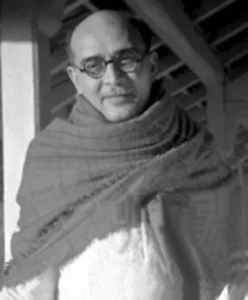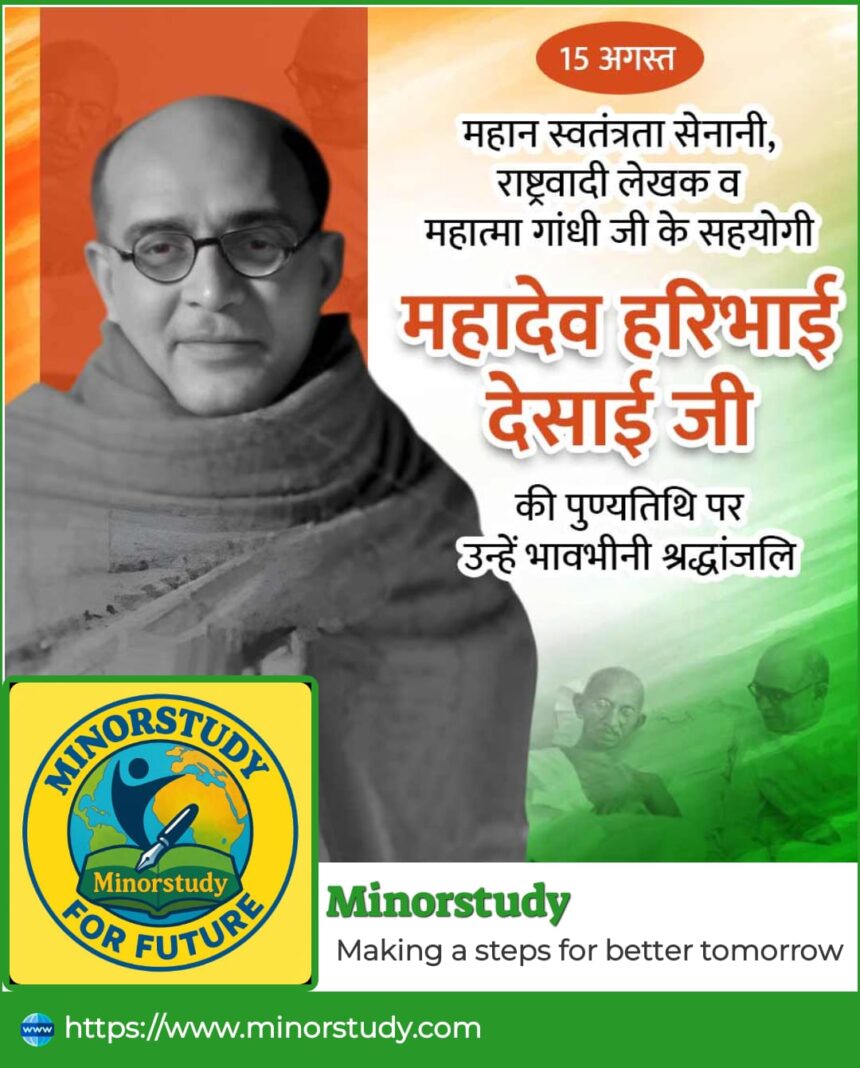Mahadev Desai Ji – Gandhi’s Boswell & the Voice of Our Freedom
Introduction
Mahadev Haribhai Desai (1 January 1892 – 15 August 1942) wasn’t just Mahatma Gandhi’s personal secretary—he was his confidant, chronicler, and steadfast soul companion. Behind the serene public image of Gandhi was Mahadev Desai tirelessly shaping thoughts, organizing movements, and capturing the spirit of the Indian freedom struggle in his profound diaries. His life blends selfless service with intellectual fire and is deeply relevant in our everyday lives.
- Mahadev Desai Ji – Gandhi’s Boswell & the Voice of Our Freedom
- 1. Early Life & Education
- 2. Transition to Gandhi’s Circle
- 3. Facts That Make Him Legendary
- 4. Timeline of His Life
- 5. Why Mahadev Desai Matters
- 6. Observing & Wishing Him
- 7. Daily Life Lessons from His Persona
- 8. Importance to Society
- 9. FAQs
- 10. Key Takeaways
- Conclusion
1. Early Life & Education
Born in Saras, Surat district, Gujarat, to father Haribhai (a schoolteacher) and mother Jamnabehn, Mahadev lost his mother at age seven. A bright student, he topped his matriculation in 1906, studied at Elphinstone College, and completed LLB by 1913—all while helping his family financially.Mahatma Gandhi WebsiteIndian History Collective
2. Transition to Gandhi’s Circle
Mahadev met Gandhi in 1917 through literary work and joined the Sabarmati Ashram, taking on the role of secretary at just 25. From then till his death 25 years later, he lived Gandhi’s day, documented his every lesson, and became indispensable.Mahatma Gandhi WebsiteJanata WeeklyIndian History Collective
3. Facts That Make Him Legendary
Gandhi’s Boswell: His rigorous diary (11 Nov 1917 – 14 Aug 1942) became the primary source for Gandhi’s words. Published as Day-to-Day with Gandhi, it spans over 23 volumes.Mahatma Gandhi WebsitePMMLKiddle
Home & Foreign Secretary for Gandhi: Managed every aspect of Gandhi’s life—office, visitors, publishing, personal schedules, and correspondence.::Welcome to Ramachandra Guha.in::
Journalist & Editor: Took over Independent in 1920 when its presses were seized; crafted handwritten cyclostyled editions. Later, helmed Navajivan and translated Gandhi’s autobiography serially in Young India.Wikipedia
Freedom Fighter: Actively involved in Champaran (1917), Kheda (1918), Bardoli (1928), Salt Satyagraha (1930), Civil Disobedience (1932), and Quit India (1942).PMMLWikipedia+1Indian History Collective
Prison Reformer: His vivid prison reports prompted major administrative changes.Wikipedia
Translator & Biographer: Authored works like The Story of Bardoli, Gita According to Gandhi, and life sketches of eminent figures.PMMLindiadonz.blogspot.com
Loyal until the End: Arrested during Quit India in 1942, he died of a heart attack at Aga Khan Palace, resting with Gandhi’s lap as his last refuge.WikipediaMahatma Gandhi Website
4. Timeline of His Life
| Year | Milestone |
|---|---|
| 1892 | Born 1 Jan in Saras, Gujarat |
| 1906–1913 | Achieved top matriculation, B.A., and LLB |
| 1917 | Joined Gandhi at Sabarmati Ashram |
| 1920 | Edited Independent newspaper |
| 1924–25 | Edited Navajivan; translated Gandhi’s memoir in Young India |
| 1917–1942 | Chronicled Gandhi’s journey in diaries |
| 1930 | Imprisoned during Salt Satyagraha |
| 1942 | Arrested during Quit India; died 15 Aug at Aga Khan Palace |
5. Why Mahadev Desai Matters
Voice of History: His diaries capture Gandhi’s inner life and thought process—an unmatched window into our past.
Engine of Strategy: He ensured the smooth functioning of countless campaigns, making freedom efforts effective.
Shower of Humanity: Even amidst turmoil, he brought warmth, humor, and grace to Gandhi’s life and work.Mahatma Gandhi Website::Welcome to Ramachandra Guha.in::
Beacon of Sacrifice: His unwavering dedication, even unto death, teaches the power of selfless service.
6. Observing & Wishing Him
Though not widely commemorated nationally, many Gandhian organizations observe his death and birth anniversaries with readings and reflections.
Wishing Lines:
“May Mahadev Desai’s selfless devotion and mindfulness guide our steps—with courage rooted in service and clarity in action.”
7. Daily Life Lessons from His Persona
Document Your Values: Like Mahadev, keep a record—not just of events but insights that may illuminate the future.
Serve Quietly, Act Boldly: True impact often comes from behind the scenes.
Live with Integrity: His discipline, humility, and resilience are beacons for today’s complex world.
Blend the Intellectual with the Spiritual: Let knowledge serve purpose, not ego.

8. Importance to Society
Historical Anchor: His writings remain primary sources for Gandhi and the freedom movement.
Moral Compass: He helps us navigate leadership with compassion, clarity, and inner depth.
Legacy of Courage: As a chronicler and servant, he dominates an essential role in building collective memory and national identity.
9. FAQs
Q1: Who was Mahadev Desai?
Gandhi’s personal secretary, editor, chronicler, and freedom activist.
Q2: What did he write?
His diaries (Day-to-Day with Gandhi), The Story of Bardoli, Gita According to Gandhi, and many translations.
Q3: Why are his diaries important?
They offer authentic, day-to-day insight into Gandhi’s mind and the freedom struggle.Mahatma Gandhi WebsitePMML
Q4: When did he die?
He passed away on 15 August 1942 at Aga Khan Palace.Wikipedia+1
Q5: What qualities mark his legacy?
Unshakable loyalty, intellectual rigor, discipline, humility, and service.
10. Key Takeaways
Born 1 January 1892, died 15 August 1942.
Served Gandhiji for 25 years as secretary and chronicler.
Edited key publications like Independent and Navajivan.
Kept invaluable diaries spanning 25 years—primary source for Gandhi’s legacy.
Embodied devotion, clarity, and compassion while navigating tumultuous times.
Conclusion
Mahadev Desai Ji was more than an aide; he was the pen that made Gandhi human, the heart that upheld movements, and the soul that bound us to values beyond writing and speeches.
In today’s age—where visibility often overshadows substance—his life urges us: serve with honesty, act with intention, and let your work speak for itself.
May we continue to draw from his unwavering spirit to live meaningful lives anchored in purpose, discipline, and compassion.








